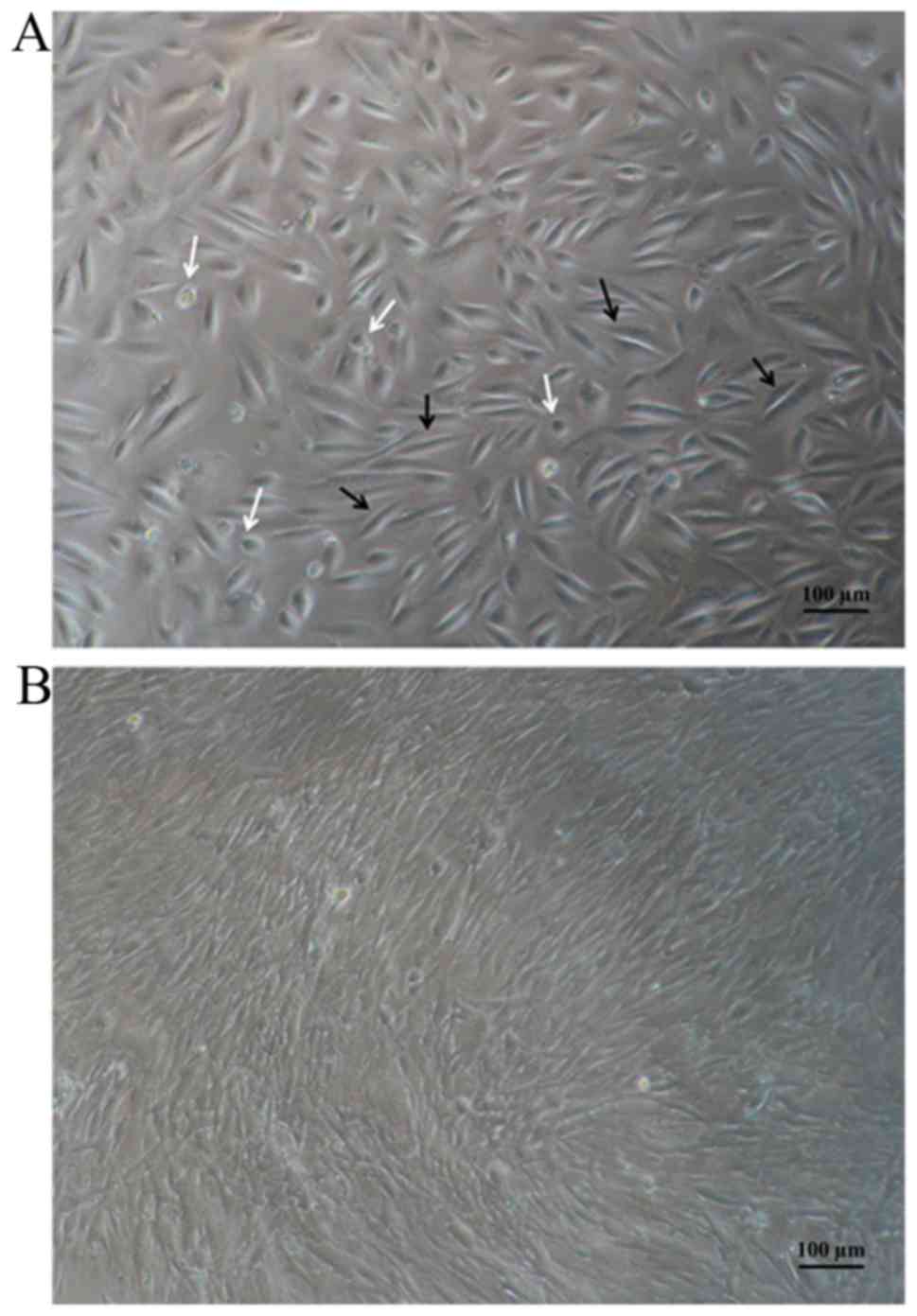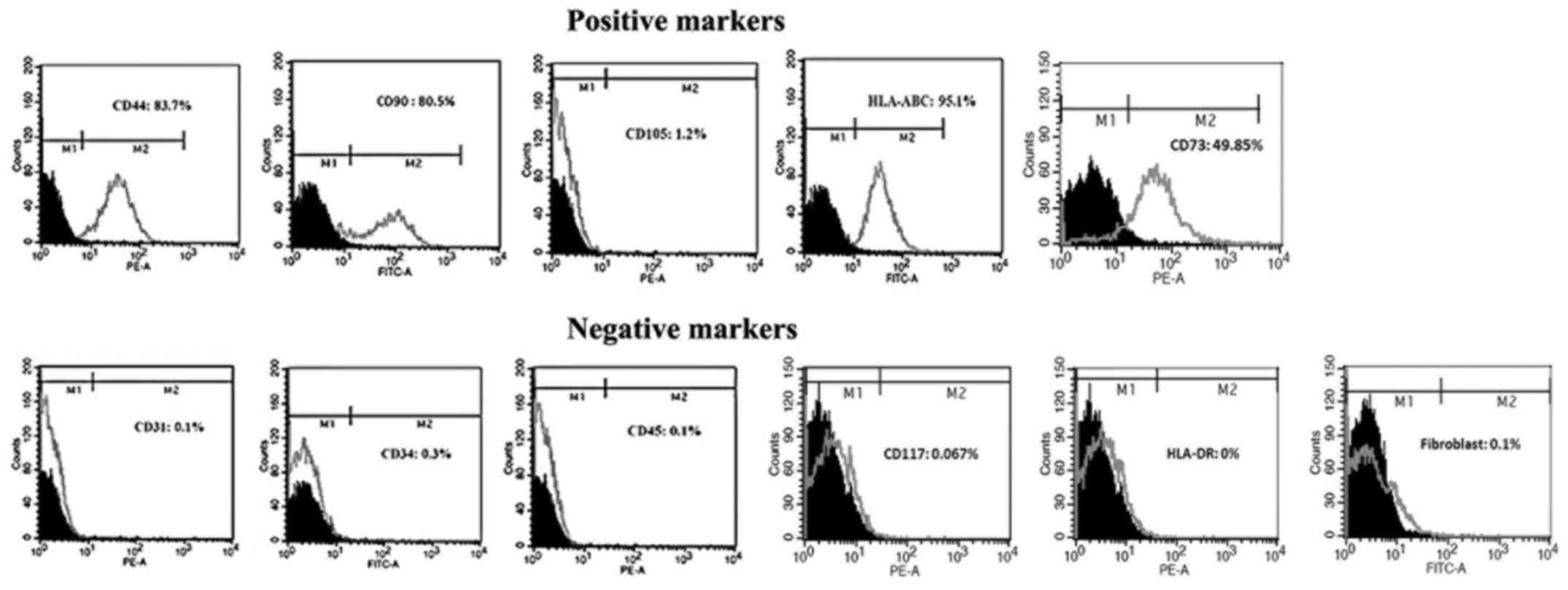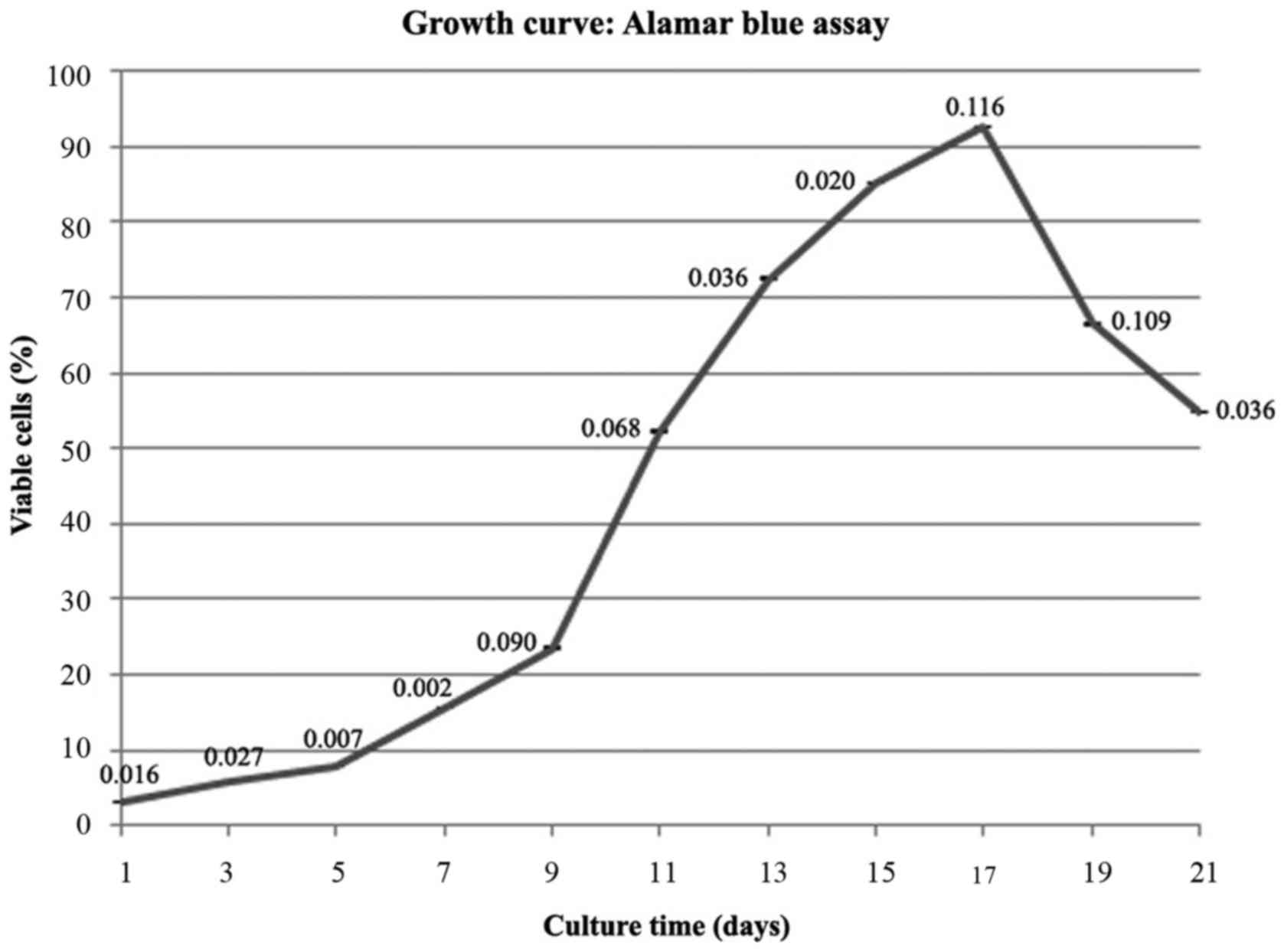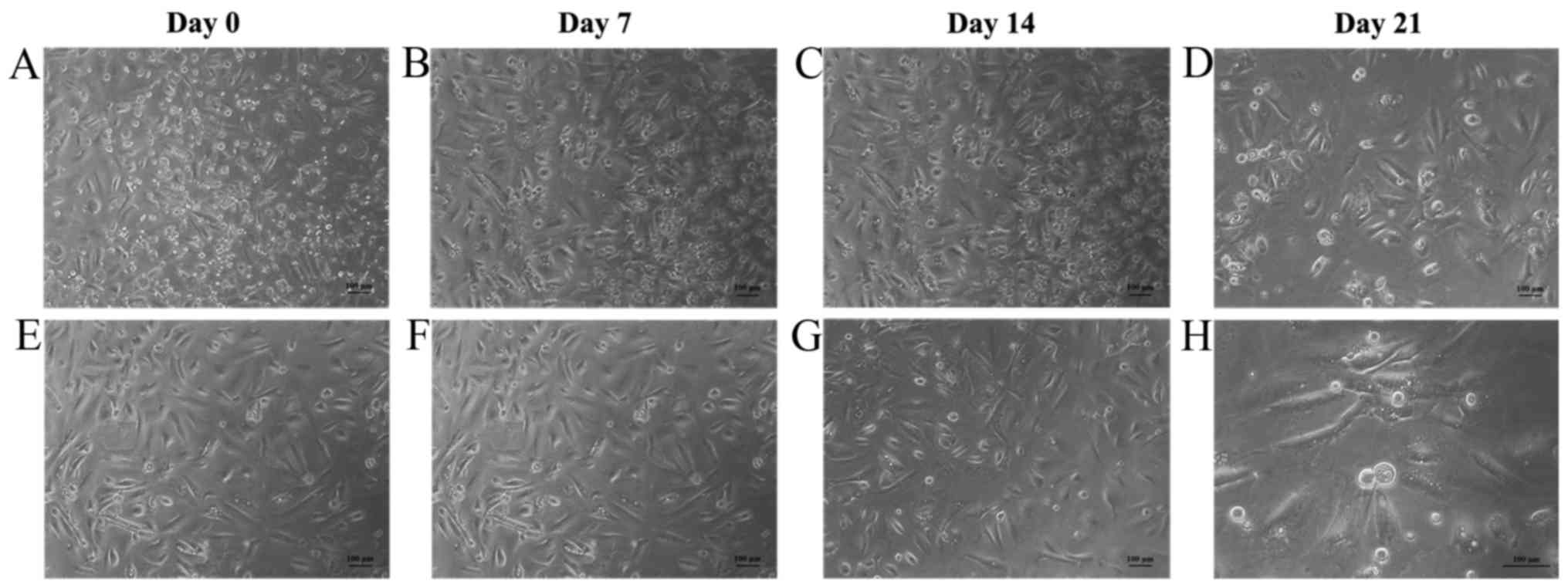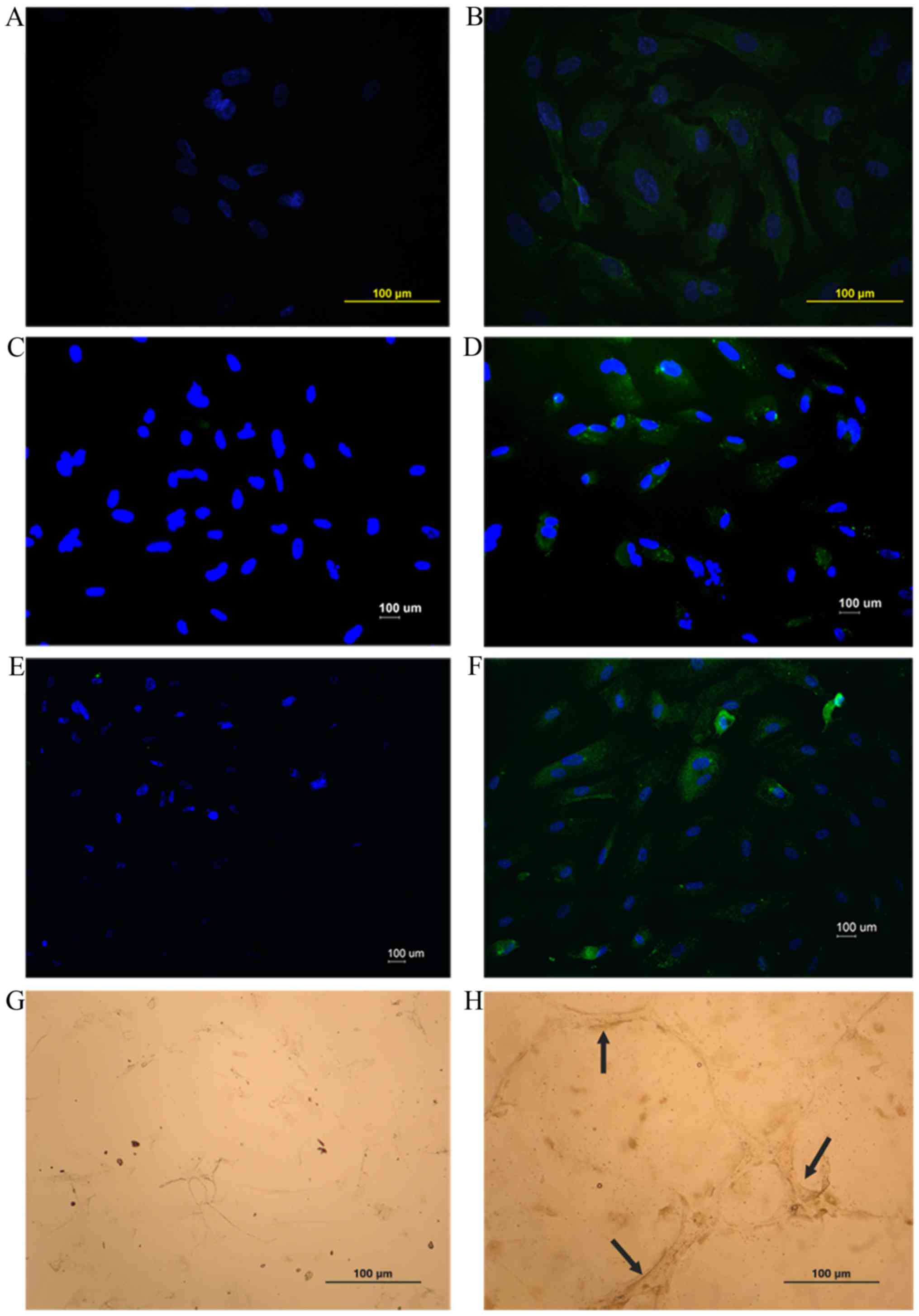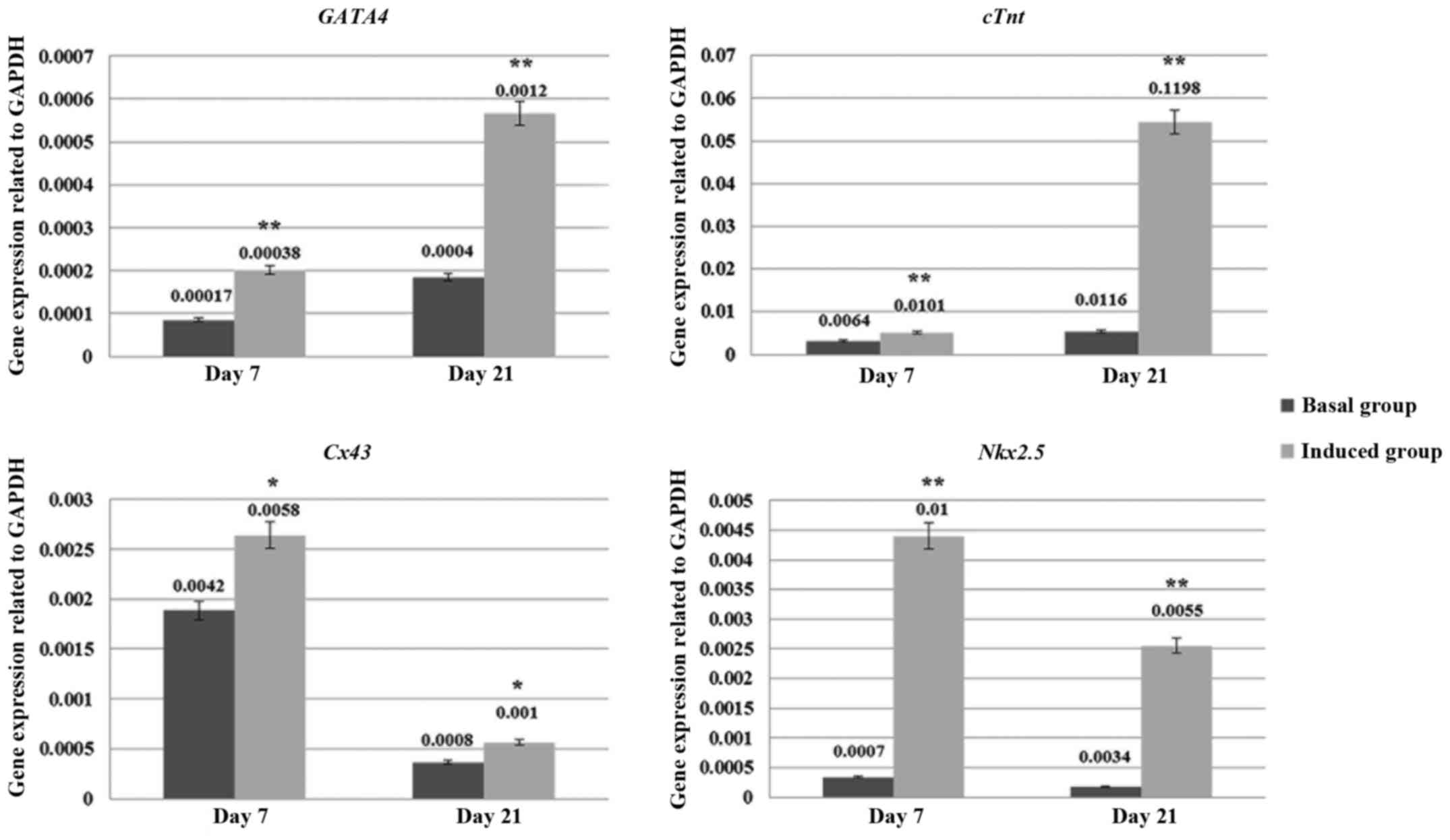|
1
|
Kiatchoosakun S, Sutra S and
Thepsuthammarat K: Coronary artery disease in the Thai population:
Data from health situation analysis 2010. J Med Assoc Thai. 95
Suppl 7:S149–S155. 2012.PubMed/NCBI
|
|
2
|
Hansen JT and Lambert DR: Netter's
clinical anatomy. Elsevier; Philadelphia: pp. 5–7. 2010
|
|
3
|
Fukuda K: Development of regenerative
cardiomyocytes from mesenchymal stem cells for cardiovascular
tissue engineering. Artif Organs. 25:187–193. 2001. View Article : Google Scholar : PubMed/NCBI
|
|
4
|
Mescher AL: Junqueira's Basic Histology.
McGraw-Hill; New York: pp. 1842010
|
|
5
|
Passier R and Mummery C: Cardiomyocyte
differentiation from embryonic and adult stem cells. Curr Opin
Biotechnol. 16:498–502. 2005. View Article : Google Scholar : PubMed/NCBI
|
|
6
|
Kadivar M, Khatami S, Mortazavi Y,
Shokrgozar MA, Taghikhani M and Soleimani M: In vitro
cardiomyogenic potential of human umbilical vein-derived
mesenchymal stem cells. Biochem Biophys Res Commun. 340:639–647.
2006. View Article : Google Scholar : PubMed/NCBI
|
|
7
|
Makino S, Fukuda K, Miyoshi S, Konishi F,
Kodama H, Pan J, Sano M, Takahashi T, Hori S, Abe H, et al:
Cardiomyocytes can be generated from marrow stromal cells in vitro.
J Clin Invest. 103:697–705. 1999. View
Article : Google Scholar : PubMed/NCBI
|
|
8
|
Nartprayut K, U-Pratya Y, Kheolamai P,
Manochantr S, Chayosumrit M, Issaragrisil S and Supokawej A:
Cardiomyocyte differentiation of perinatally-derived mesenchymal
stem cells. Mol Med Rep. 7:1465–1469. 2013. View Article : Google Scholar : PubMed/NCBI
|
|
9
|
Shen H, Wang Y, Zhang Z, Yang J, Hu S and
Shen Z: Mesenchymal stem cells for cardiac regenerative therapy:
Optimization of cell differentiation strategy. Stem Cells Int.
2015:5247562015. View Article : Google Scholar : PubMed/NCBI
|
|
10
|
Singh A, Singh A and Sen D: Mesenchymal
stem cells in cardiac regeneration: A detailed progress report of
the last 6 years (2010–2015). Stem Cell Res Ther. 7:822016.
View Article : Google Scholar : PubMed/NCBI
|
|
11
|
Wakitani S, Saito T and Caplan AI:
Myogenic cells derived from rat bone marrow mesenchymal stem cells
exposed to 5-azacytidine. Muscle Nerve. 18:1417–1426. 1995.
View Article : Google Scholar : PubMed/NCBI
|
|
12
|
Bai J, Hu Y, Wang YR, Lui LF, Chen J, Su
SP and Wang Y: Comparison of human amniotic fluid-derived and
umbilical cord Wharton's jelly-derived mesenchymal stromal cells:
Characterization and myocardial differentiation capacity. J Geriatr
Cardiol. 9:166–171. 2012. View Article : Google Scholar : PubMed/NCBI
|
|
13
|
Kim J, Lee Y, Kim H, Hwang KJ, Kwon HC,
Kim SK, Cho DJ, Kang SG and You J: Human amniotic fluid-derived
stem cells have characteristics of multipotent stem cells. Cell
Prolif. 40:75–90. 2007. View Article : Google Scholar : PubMed/NCBI
|
|
14
|
Dominici M, Le Blanc K, Muller I,
Slaper-Cortenbach I, Marini F, Krause D, Deans R, Keating A,
Prockop Dj and Horwitz E: Minimal criteria for defining multipotent
mesenchymal stromal cells. The International Society for Cellular
Therapy position statement. Cytotherapy. 8:315–317. 2006.
View Article : Google Scholar : PubMed/NCBI
|
|
15
|
Savickiene J, Treigyte G, Baronaite S,
Valiuliene G, Kaupinis A, Valius M, Arlauskiene A and Navakauskiene
R: Human amniotic fluid mesenchymal stem cells from second- and
third-trimester amniocentesis: Differentiation potential, molecular
signature, and proteome analysis. Stem Cells Int. 2015:3192382015.
View Article : Google Scholar : PubMed/NCBI
|
|
16
|
Fauza D: Amniotic fluid and placental stem
cells. Best Pract Res Clin Obstet Gynaecol. 18:877–891. 2004.
View Article : Google Scholar : PubMed/NCBI
|
|
17
|
Antonucci I, Stuppia L, Kaneko Y, Yu S,
Tajira N, Bae EC, Chheda SH, Weinbren NL and Borlongan CV: Amniotic
fluid as a rich source of mesenchymal stromal cells for
transplantation therapy. Cell Transplant. 20:789–795. 2011.
View Article : Google Scholar : PubMed/NCBI
|
|
18
|
Rossi B, Merlo B, Colleoni S, Iacono E,
Tazzari PL, Ricci F, Lazzari G and Galli C: Isolation and in vitro
characterization of bovine amniotic fluid derived stem cells at
different trimesters of pregnancy. Stem Cell Rev. 10:712–724. 2014.
View Article : Google Scholar : PubMed/NCBI
|
|
19
|
Prusa AR, Marton E, Rosner M, Bernaschek G
and Hengstschläger M: Oct-4 expressing cells in human amniotic
fluid: A new source for stem cell research. Hum Reprod.
18:1489–1493. 2003. View Article : Google Scholar : PubMed/NCBI
|
|
20
|
Fei X, Jiang S, Zhang S, Li Y, Ge J, He B,
Goldstein S and Ruiz G: Isolation, culture, and identification of
amniotic fluid-derived mesenchymal stem cells. Cell Biochem
Biophys. 67:689–694. 2013. View Article : Google Scholar : PubMed/NCBI
|
|
21
|
Bartunek J, Croissant JD, Winjns W,
Gofflot S, de Lavareille A, Vanderheyden M, Kaluzhny Y, Mazouz N,
Willemsen P, Penicka M, et al: Pretreatment of adult bone marrow
mesenchymal stem cells with cardiomyogenic growth factors and
repair of the chronically infracted myocardium. Am J Physiol Heart
Circ Physiol. 292:H1095–H1104. 2007. View Article : Google Scholar : PubMed/NCBI
|
|
22
|
Hahn JY, Cho HJ, Kang HJ, Kim MH, Chung
JH, Bae JW, Oh BH, Park YB and Kim HS: Pre-treatment of mesenchymal
stem cells with a combination of growth factors enhances gap
junction formatio, cytoprotective effect on cerdiomyocytes, and
therapeutic efficacy for myocardial infraction. J Am Coll Cardiol.
51:933–943. 2008. View Article : Google Scholar : PubMed/NCBI
|
|
23
|
Khanabdali R, Saadat A, Fazilah M, Bazli
KF, Qazi RE, Khalid RS, Adli DS Hasan, Moghadamtousi SZ, Naeem N,
Khan I, et al: Promoting effect of small molecules in
cardiomyogenic and neurogenic differentiation of rat bone
marrow-derived mesenchymal stem cells. Drug Des Devel Ther.
10:81–91. 2015.PubMed/NCBI
|
|
24
|
Kumar BM, Maeng GH, Lee YM, Kim TH, Lee
JH, Jeon BG, Ock SA, Yoo JG and Rho GJ: Neurogenic and
cardiomyogenic differentiation of mesenchymal stem cells isolated
from minipig bone marrow. Res Vet Sci. 93:749–757. 2012. View Article : Google Scholar : PubMed/NCBI
|
|
25
|
Macias MI, Grande J, Moreno A, Domínguez
I, Bornstein R and Flores AI: Isolation and characteriazation of
true mesenchymal stem cells derived from human term decidua capable
of multilineage differentiation into all 3 embryonic layers. Am J
Obstet Gynecol. 203:495.e9–e495.e23. 2010. View Article : Google Scholar
|
|
26
|
Dai W and Kloner RA: Myocardial
regeneration by human amniotic fluid stem cells: Challenges to be
outcome. J Mol Cell Cardiol. 42:730–732. 2007. View Article : Google Scholar : PubMed/NCBI
|
|
27
|
Ferdaos N and Nordin N: Human amniotic
fluid cells and their future perspectives. Regenerative Research.
1:14–19. 2012.
|
|
28
|
Rosner M, Dolznig H, Schipany K, Mikula M,
Brandau O and Hengstschläger M: Human amniotic fluid stem cells as
a model for functional studies of genes involved in human genetic
diseases or oncogenesis. Oncotarget. 2:705–712. 2011. View Article : Google Scholar : PubMed/NCBI
|
|
29
|
Chao KC, Yang HT and Chen MW: Human
umbilical cord mesenchymal stem cells suppress breast cancer
tumourigenesis through direct cell-cell contact and
internalization. J Cell Mol Med. 16:1803–1815. 2012. View Article : Google Scholar : PubMed/NCBI
|
|
30
|
Tsai MS, Hwang SM, Tsai YL, Cheng FC, Lee
JL and Chang Y: Clonal amniotic fluid-derived stem cells express
characteristics of both mesenchymal and neural stem cells. Biol
Reprod. 74:545–551. 2006. View Article : Google Scholar : PubMed/NCBI
|
|
31
|
Zhao F and Ma T: Perfusion bioreactor
system for human mesenchymal stem cell tissue engineering: Dynamic
cell seeding and construct development. Biotechnol Bioeng.
91:482–493. 2005. View Article : Google Scholar : PubMed/NCBI
|
|
32
|
De Coppi P, Bartsch G Jr, Siddiqui MM, Xu
T, Santos CC, Perin L, Mostoslavsky G, Serre AC, Snyder EY, Yoo JJ,
et al: Isolation of amniotic stem cell lines with potential for
therapy. Nat Biotechnol. 25:100–106. 2007. View Article : Google Scholar : PubMed/NCBI
|
|
33
|
Kaviani A, Perry TE, Dzakovic A, Jennings
RW, Ziegler MM and Fauza DO: The amniotic fluid as a source of
cells for fetal tissue engineering. J Pediatr Surg. 36:1662–1165.
2001. View Article : Google Scholar : PubMed/NCBI
|
|
34
|
Trohatou O, Anagnou NP and Roubelakis MG:
Human amniotic fluid stem cells as an attractive tool for clinical
applications. Curr Stem Cell Res Ther. 8:125–132. 2013. View Article : Google Scholar : PubMed/NCBI
|
|
35
|
Almalki SG and Agrawal DK: Key
transcription factors in the differentiation of mesenchymal stem
cells. Differentiation. 92:41–51. 2016. View Article : Google Scholar : PubMed/NCBI
|
|
36
|
Hartmann K, Raabe O, Wenisch S and Arnhold
S: Amniotic fluid derived stem cells give rise to neuron-like cells
without a further differentiation potential into retina-like cells.
Am J Stem Cells. 2:108–118. 2013.PubMed/NCBI
|
|
37
|
Bossolasco P, Montemurro T, Cova L,
Zangrossi S, Calzarossa C, Buiatiotis S, Soligo D, Bosari S, Silani
V, Deliliers GL, et al: Molecular and phenotypic characterization
of human amniotic fluid cells and their differentiation potential.
Cell Res. 16:329–336. 2006. View Article : Google Scholar : PubMed/NCBI
|
|
38
|
Mareschi K, Rustichelli D, Comunanza V, De
Fazio R, Cravero C, Morterra G, Martinoglio B, Medico E, Carbone E,
Benedetto C and Fagioli F: Multipotent mesenchymal stem cells from
amniotic fluid originate neural precursors with functional
voltage-gated sodium channels. Cytotherapy. 11:534–547. 2009.
View Article : Google Scholar : PubMed/NCBI
|
|
39
|
In't Anker PS, Scherjon SA, Kleijburg-van
der Keur C, Noort WA, Claas FH, Willemze R, Fibbe WE and Kanhai HH:
Amniotic fluid as a novel source of mesenchymal stem cells for
therapeutic transplantation. Blood. 102:1548–1549. 2003. View Article : Google Scholar : PubMed/NCBI
|
|
40
|
Pievani A, Scagliotti V, Russo FM, Azario
I, Rambaldi B, Sacchetti B, Marzorati S, Erba E, Giudici G,
Riminucci M, et al: Comparative analysis of multilineage properties
of mesenchymal stromal cells derived from fetal sources shows an
advantage of mesenchymal stromal cells isolated from cord blood in
chondrogenic differentiation potential. Cytotherapy. 16:893–905.
2014. View Article : Google Scholar : PubMed/NCBI
|
|
41
|
Barry FP and Murphy JM: Mesenchymal stem
cells: Clinical applications and biological characterization. Int J
Biochem Cell Biol. 36:568–584. 2004. View Article : Google Scholar : PubMed/NCBI
|
|
42
|
L Ramos T, Sánchez-Abarca LI, Muntión S,
Preciado S, Puig N, López-Ruano G, Hernández-Hernández Á, Redondo
A, Ortega R, Rodríguez C, et al: MSC surface markers (CD44, CD73,
and CD90) can identify human MSC-derived extracellular vesicles by
conventional flow cytometry. Cell Commun Signal. 14:22016.
View Article : Google Scholar : PubMed/NCBI
|
|
43
|
Cananzi M and De Coppi P: CD117(+)
amniotic fluid stem cells: State of the art and future
perspectives. Organogenesis. 8:77–88. 2012. View Article : Google Scholar : PubMed/NCBI
|
|
44
|
Duff SE, Li C, Garland JM and Kumar S:
CD105 is important for angiogenesis: Evidence and potential
applications. FASEB J. 17:984–992. 2003. View Article : Google Scholar : PubMed/NCBI
|
|
45
|
Maleki M, Ghanbarvand F, Behvarz M Reza,
Ejtemaei M and Ghadirkhomi E: Comparison of mesenchymal stem cell
markers in multiple human adult stem cells. Int J Stem Cells.
7:118–126. 2014. View Article : Google Scholar : PubMed/NCBI
|
|
46
|
Mark P, Kleinsorge M, Gaebel R, Lux CA,
Toelk A, Pittermann E, David R, Steinhoff G and Ma N: Human
mesenchymal stem cells display reduced expression of CD105 after
culture in serum-free medium. Stem Cells Int. 2013:6980762013.
View Article : Google Scholar : PubMed/NCBI
|
|
47
|
Carraro G, Garcia OH, Perin L, Filippo RD
and Warburton D: Amniotic fluid stem cells. Amniotic fluid stem
cells, Embryonic stem cells-Differentiation and pluripotent
alternativesEmbryonic Stem Cells-Differentiation and Pluripotent
Alternatives. Kallos MS: IN TECH; Croatia: pp. 1–506. 2011
|
|
48
|
Yoon YS, Park JS, Tkebuchava T, Luedeman C
and Losordo DW: Unexpected severe calcification after
transplantation of bone marrow cells in acute myocardial
infraction. Circulation. 109:3154–3157. 2004. View Article : Google Scholar : PubMed/NCBI
|
|
49
|
Li H, Zuo S, He Z, Yang Y, Pasha Z, Wang Y
and Xu M: Paracrine factors released by GATA-4 overexpressed
mesenchymal stem cells increase angiogenesis and cell survival. Am
J Physiol Heart Circ Physiol. 299:H1772–H1781. 2010. View Article : Google Scholar : PubMed/NCBI
|
|
50
|
Oma Y and Harata M: Actin-related proteins
localized in the nucleus: From discovery to novel roles in nuclear
organizeation. Nucleus. 2:38–46. 2011. View Article : Google Scholar : PubMed/NCBI
|
|
51
|
Stennard FA, Costa MW, Elliott DA, Rankin
S, Haast SJ, Lai D, McDonald LP, Niederreither K, Dolle P, Bruneau
BG, et al: Cardiac T-box factor Tbx20 directly interacts with
Nkx2-5, GATA4, and GATA5 in regulation of gene expression in the
developing heart. Dev Biol. 262:206–224. 2003. View Article : Google Scholar : PubMed/NCBI
|
|
52
|
Laird DW: The gap junction proteome and
its relationship to diesase. Trends Cell Biol. 20:92–101. 2010.
View Article : Google Scholar : PubMed/NCBI
|
|
53
|
Armiñán A, Gandía C, García-Verdugo JM,
Lledó E, Mullor JL, Montero JA and Sepúlveda P: Cardiac
transcription factors driven lineage-specification of adult stem
cells. J Cardiovasc Transl Res. 3:61–65. 2010. View Article : Google Scholar : PubMed/NCBI
|
|
54
|
Yamada Y, Sakurada K, Takeda Y, Gojo S and
Umezawa A: Single-cell-derived mesenchymal stem cells
overexpressing Csx/Nkx2.5 and GATA4 undergo the stochastic
cerdiomyogenic fate and behave like transient amplifying cells. Exp
Cell Res. 313:698–706. 2007. View Article : Google Scholar : PubMed/NCBI
|
|
55
|
Chen J, Lu Z, Cheng D, Peng S and Wang H:
Isolation and characterization of porcine amniotic fluid-derived
multipotent stem cells. PLoS One. 6:e199642011. View Article : Google Scholar : PubMed/NCBI
|
|
56
|
Connell J Petsche, Camci-Unal G,
Khademhosseini A and Jacot JG: Amniotic fluid-derived stem cells
for cardiovascular tissue engineering applications. Tissue Eng Part
B Rev. 19:368–379. 2013. View Article : Google Scholar : PubMed/NCBI
|
|
57
|
Qian Q, Qian H, Zhang X, Zhu W, Yan Y, Ye
S, Peng X, Li W, Xu Z, Sun L and Xu W: 5-Azacytidine induces
cardiac differentiation of human umbilical cord-derived mesenchymal
stem cells by activating extracellular regulated kinase. Stem Cells
Dev. 21:67–75. 2012. View Article : Google Scholar : PubMed/NCBI
|















